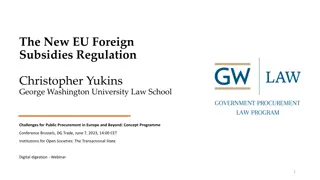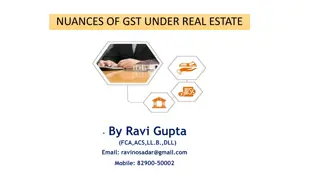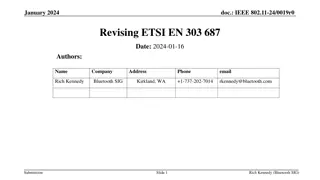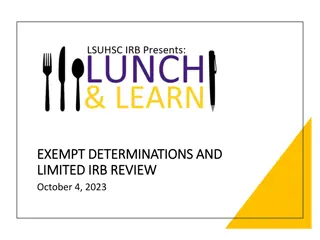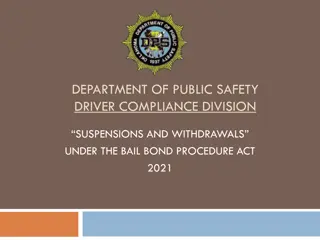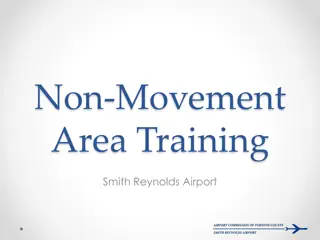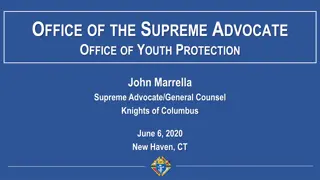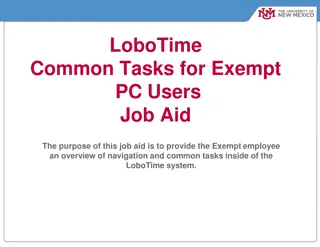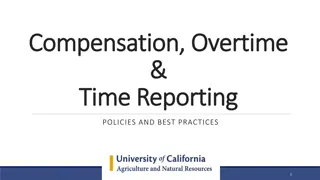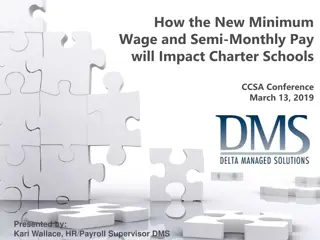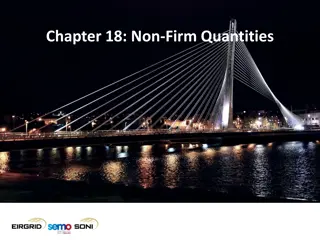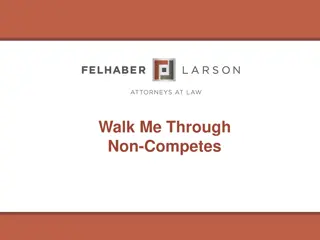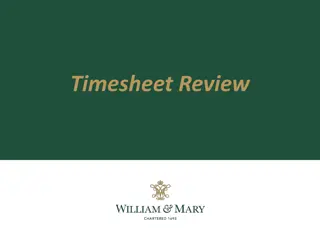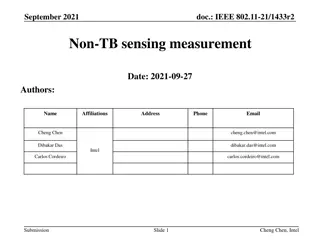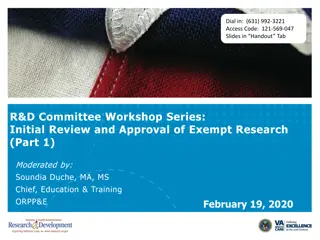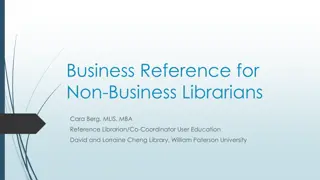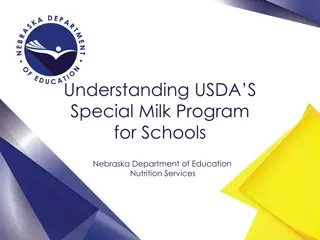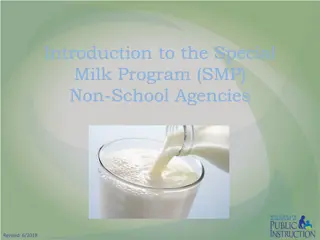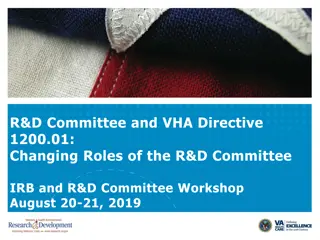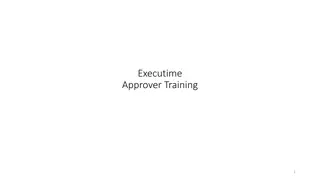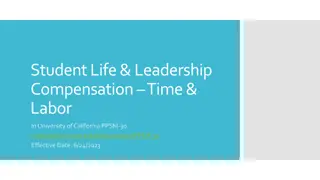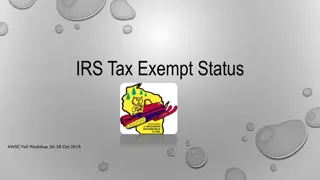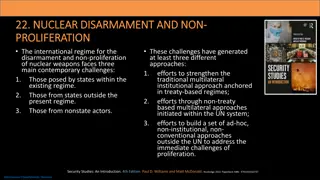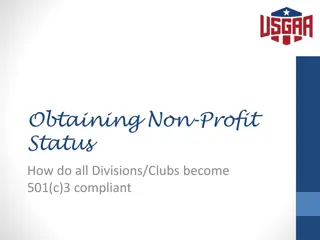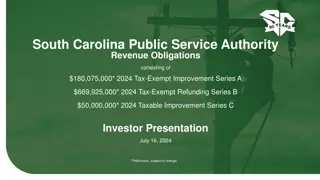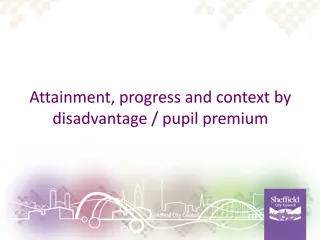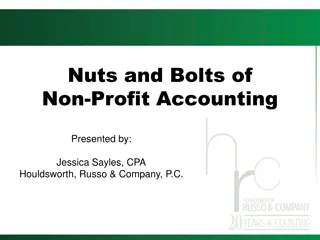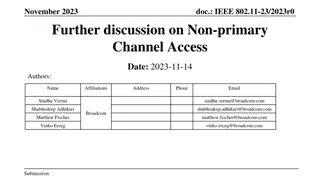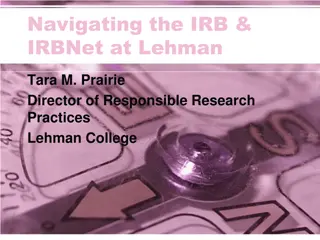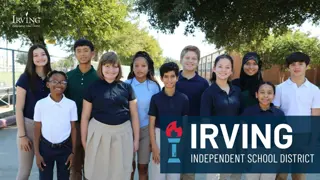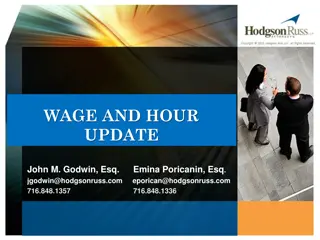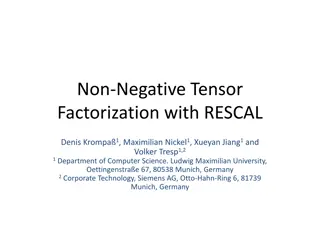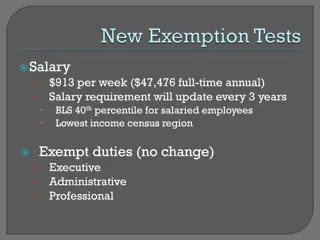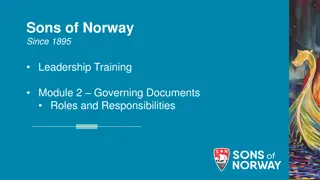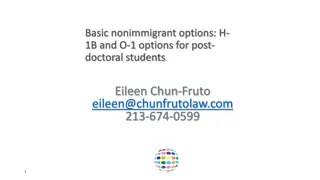Understanding IRB Review Process for Research Studies
The content provides an overview of the IRB review process for research studies, including what necessitates IRB review, the levels of IRB review (exempt, expedited, full board), examples of full board research, and criteria for an Investigational New Drug.
1 views • 17 slides
Challenges of EU Foreign Subsidies Regulation in Public Procurement
The EU Foreign Subsidies Regulation (FSR) imposes EU State aid rules on foreign vendors in EU Member States, creating disclosure requirements and review processes. This regulation poses administrative burdens and strategic challenges for vendors, particularly impacting EU-based vendors purchasing fr
2 views • 7 slides
Tax Considerations for Incentive, Recognition & Safety Programs
This presentation provides guidelines on tax implications, exemptions, and reporting obligations related to incentive, recognition, and safety programs. It emphasizes the importance of understanding tax considerations for program sponsors and participants to ensure compliance with applicable laws an
3 views • 14 slides
Understanding GST Nuances in Real Estate
The realm of GST in real estate, particularly works contracts and property sales, is intricate and crucial to the country's GDP growth. This includes transactions like leases, constructions, and sales, all of which have specific provisions under the CGST Act. While some real estate transactions are
2 views • 36 slides
Revising ETSI Standard for License-Exempt Operation in 6 GHz Band
Work has commenced on revising the ETSI standard EN 303.687 for license-exempt operation in the 6 GHz band to expedite completion. This revision project outlines the history, New Work Item approval, ETSI processes, and the upcoming steps. It traces back to 2017 when Switzerland and ECC administratio
0 views • 10 slides
Understanding IRB Review Levels and Exempt Determinations
Explore the levels of IRB review for human participant research, including Exempt, Expedited, and Full Board reviews. Learn about the categories of Exempt Determinations and the criteria for Limited IRB Review. Understand if your study requires IRB review based on research and human subject involvem
1 views • 12 slides
Oklahoma Department of Public Safety Driver Compliance Division: Information on Suspensions and Withdrawals under the Bail Bond Procedure Act 2021
This information provides details on driver license suspensions for failure to appear, contact information for assistance, and guidelines to follow when filling out suspension notices. Certain violations are not eligible for failure to appear actions, and the document outlines what to remember about
0 views • 28 slides
Establishing Safety Standards in Non-Movement Areas at Smith Reynolds Airport
This guide outlines the purpose, definitions, rules, and safety measures for operating vehicles in non-movement areas at Smith Reynolds Airport. It emphasizes standardized ground movement practices to ensure the safety of airport patrons, reduce the risk of injury, and maintain a high level of safet
1 views • 12 slides
Annual Filing Requirements for Knights of Columbus Councils
Learn about the IRS annual filing requirements for Knights of Columbus Councils, including the need to file Form 990, obtain an EIN, and maintain tax-exempt status. Failure to comply can result in the revocation of tax-exempt status and reinstatement fees. Find detailed guidance on applying for an E
0 views • 23 slides
Understanding Non-Aqueous Solvents: Types and Classification
Inorganic non-aqueous solvents play a crucial role in chemical research and industry. This article by Dr. Princy K.G. delves into the classification of solvents based on protonicity, polarity, and aqueous vs. non-aqueous nature. It explores the types of non-aqueous solvents, such as protonic and non
1 views • 29 slides
Exempt Employee LoboTime Navigation and Common Tasks Guide
This job aid provides an overview for exempt employees on navigating and performing common tasks in the LoboTime system. It covers logging on and off, accessing different workspaces, managing widgets, requesting time off, and retracting time off requests. Visual aids accompany detailed step-by-step
0 views • 7 slides
Understanding Compensation, Overtime, and Time Reporting Policies
This content discusses important topics such as compensation, overtime, exempt vs. non-exempt classification, and salary thresholds. It aims to provide a comprehensive understanding of the rules and regulations surrounding time reporting and compensation for staff and academic employees. Topics cove
0 views • 39 slides
Impact of New Minimum Wage and Semi-Monthly Pay on Charter Schools
Presentation by Kari Wallace at the CCSA Conference on how the progressive increase in California's minimum wage affects exempt/non-exempt classifications and the introduction of semi-monthly payrolls. The presentation discusses key details, including Delta Managed Solutions' experience, labor code
0 views • 33 slides
Understanding Non-Firm Quantities in Electricity Markets
Non-Firm Quantities in electricity markets involve units with non-firm access not being compensated for their non-firm capacity not getting accommodated on the system. The concept of Firm Access Quantity plays a key role in determining compensation levels for units, with differences in implementatio
0 views • 6 slides
Understanding Non-Compete Agreements: Enforceability and Requirements
Non-compete agreements are commonly used in the United States to protect businesses from competition by former employees. To be enforceable, these agreements must meet certain requirements, including independent consideration, protection of legitimate business interests, and reasonableness in scope,
0 views • 26 slides
Efficient Timesheet Reporting Guidelines for Non-Exempt Employees
Comprehensive guide detailing requirements and procedures for reporting hours on timesheets, including minimum hours, overtime, and how to record additional hours. Key points include reporting a minimum of 40 hours per week, differentiating between regular and additional hours, and considering pay p
5 views • 11 slides
Comparison of Trigger-based vs. Non-Trigger-based Sensing Measurement in IEEE 802.11
The document discusses the differences between Trigger-based (TB) and Non-Trigger-based (Non-TB) sensing measurement instances in IEEE 802.11 standards, focusing on who initiates the sensing measurement. TB sensing is initiated by the AP, while Non-TB sensing is initiated by a non-AP STA, enabling o
6 views • 13 slides
Understanding Exempt Research Categories and Requirements
Exploring the concept of exempt research in the context of the Common Rule and VA guidelines, this workshop series delves into the obligations and responsibilities of key entities involved in the initial review and approval process. It clarifies what it means to be exempt, outlines the categories of
0 views • 28 slides
Business Reference Resources for Non-Business Librarians
Access a variety of business reference tools tailored for non-business librarians, including databases for articles on business topics, company and industry data sources, primary and secondary sources on taxation of exempt organizations, and demographic data resources. Connect with a reference libra
0 views • 7 slides
Understanding USDA's Special Milk Program for Schools
The Special Milk Program (SMP) initiated in 1955 provides milk to children in schools, child care institutions, and summer camps not part of other Federal nutrition programs. Eligible schools must be non-profit with tax-exempt status and students cannot have access to other school meal programs. Oth
0 views • 28 slides
Understanding the Special Milk Program (SMP): Eligibility, Reimbursement, and Requirements
The Special Milk Program (SMP) encourages milk consumption among children in care settings, administered by the Department of Public Instruction (DPI) in Wisconsin. Participating agencies receive federal reimbursement for milk served to eligible children. This program operates year-round for non-sch
0 views • 34 slides
Evolution of VA Research & Development Committee Responsibilities
The article discusses the changing roles of the VA Research & Development Committee in light of VHA Directive 1200.01. It covers the rationale behind revising committee responsibilities, strategies for exempt research functions, the importance of VA R&D Committee, and the major shift in responsibili
0 views • 16 slides
Executime Automated Time & Attendance Policy Overview
Executime is an automated system for capturing employee time, streamlining processes for salary exempt, non-exempt, and hourly employees. The policy highlights clock-in rules, time-off procedures, and steps for entering and approving time. Employees are required to adhere to the guidelines outlined
0 views • 8 slides
University of California PPSM-30: Student Life & Leadership Compensation Guidelines
University of California PPSM-30 outlines guidelines regarding meal periods, rest breaks, overtime approval, and compensation for non-exempt employees. It specifies the meal period duration, rest break allocation for full-time and part-time employees, and the process for seeking advance approval for
0 views • 9 slides
Understanding UW-Madison Salary and Activities Guidelines
This document covers the guidelines and policies related to salary, compensation, and activities for faculty members at UW-Madison. It explores topics such as institutional base salary, total UW effort components, exempt employee salaries, and overload policies. It emphasizes the importance of follo
0 views • 19 slides
Guide to IRS Tax Exempt Status Application for Non-Profit Organizations
This comprehensive guide provides essential information on applying for tax-exempt status with the IRS for non-profit organizations. It covers the benefits, application procedures, responsibilities, and tools needed for a successful application process. From determining eligibility to understanding
0 views • 14 slides
Contemporary Challenges in Nuclear Disarmament and Non-Proliferation Regime
The international regime for nuclear disarmament and non-proliferation faces challenges from states within and outside the regime, as well as non-state actors. Various approaches are being utilized to address these challenges, including strengthening multilateral institutions, non-treaty-based multi
0 views • 12 slides
Guide to Becoming a 501(c)3 Compliant Division/Club
Detailed steps for Divisions/Clubs to achieve 501(c)3 compliance, including reasons to become a non-profit, incorporation process, applying for tax-exempt status, group ruling advantages, requirements for joining a group, and maintaining separate legal entity status.
0 views • 11 slides
South Carolina Public Service Authority Revenue Obligations Investor Presentation
This investor presentation provides details on South Carolina Public Service Authority Revenue Obligations for 2024, including Tax-Exempt Improvement Series A, Tax-Exempt Refunding Series B, and Taxable Improvement Series C. It emphasizes the preliminary nature of the information and the need for ca
0 views • 24 slides
Improving Attainment and Progress of Disadvantaged Pupils in Sheffield
Attainment and progress of disadvantaged pupils in Sheffield show an improving trend across key stages, although the gaps between disadvantaged and non-disadvantaged students are not closing fast enough. Data suggests that disadvantaged pupils with low prior attainment are making better progress in
0 views • 29 slides
Understanding Non-Profit Accounting Essentials
Learn the basics of non-profit accounting, including what defines a non-profit organization, common types of non-profits, governance structures, and legal responsibilities. Discover key insights on IRS and state requirements for non-profits in this informative presentation by Jessica Sayles, CPA fro
0 views • 55 slides
Addressing Issues in Supported Housing: Exempt Accommodation Oversight Act of 2023
A comprehensive overview of the Supported Housing Regulatory Oversight Act of 2023 and the challenges faced in the exempt accommodation sector. The narrative delves into the need for increased regulations, concerns about exploitation, and the positive impact of recent pilot programs on improving res
0 views • 15 slides
Further Discussion on Non-primary Channel Access in IEEE 802.11
This contribution delves into the utilization of non-primary channels for access in IEEE 802.11 networks, focusing on enhancing frequency reuse, adhering to ETSI standards, evaluating CCA capability types, and analyzing non-ideal deployment scenarios. It discusses the complexity and benefits of non-
0 views • 26 slides
Understanding IRB and IRBNet Processes at Lehman College
Explore the different types of IRB review processes, including exempt, expedited, and full/convened reviews. Learn about human subjects research, not human subjects research, and exempt categories. Discover the importance of obtaining informed consent and navigating IRBNet for research compliance at
0 views • 74 slides
Guidelines for Boosters Clubs: Key Steps for Non-Profit Incorporation and Federal/State Filings
Boosters clubs looking to incorporate as non-profit organizations need to follow specific guidelines for federal and state filings. This involves obtaining tax-exempt status, completing necessary forms for recognition, and adhering to annual filing requirements. Additionally, bylaws must be establis
0 views • 31 slides
Significant Challenges in Wage and Hour Lawsuits
Continued increase in class action wage and hour litigation poses personal liability risks for employers. Recent amendments to New York minimum wage laws and white collar exemptions, along with issues like worker misclassification, create compensation pitfalls for non-exempt employees. The surge in
0 views • 89 slides
Non-Negative Tensor Factorization with RESCAL
This article discusses non-negative tensor factorization with RESCAL, covering topics such as Non-Negative Matrix Factorization, Multiplicative Updates, RESCAL for Relational Learning, and Non-Negative Constraint for RESCAL. It explores how factorizing matrices/tensors into non-negative factors can
0 views • 11 slides
Overview of Salary Requirement Update Process in the Lowest-Income Census Region
This detailed process outlines the updating of salary requirements every 3 years to comply with BLS 40th percentile standards for salaried employees in the lowest-income census region. It involves reviewing job classifications, determining potential non-exempt positions, and seeking approvals before
0 views • 7 slides
Sons of Norway Leadership Training: Governance and Responsibilities
Sons of Norway, a fraternal benefit society since 1895, operates under IRC 501(c)(8) and 501(c)(2). This module covers governing documents, roles, and responsibilities within the organization, emphasizing the importance of fraternal purpose, the lodge system, and property management. It delves into
0 views • 12 slides
Understanding H-1B and O-1 Options for Post-Doctoral Students
The H-1B visa is a standard work visa for professionals with quotas, limitations, and opportunities for extension. Certain employers are exempt from the lottery system, such as higher education institutions and non-profit organizations. Spouses and children of H-1B holders can benefit from H-4 statu
0 views • 13 slides

